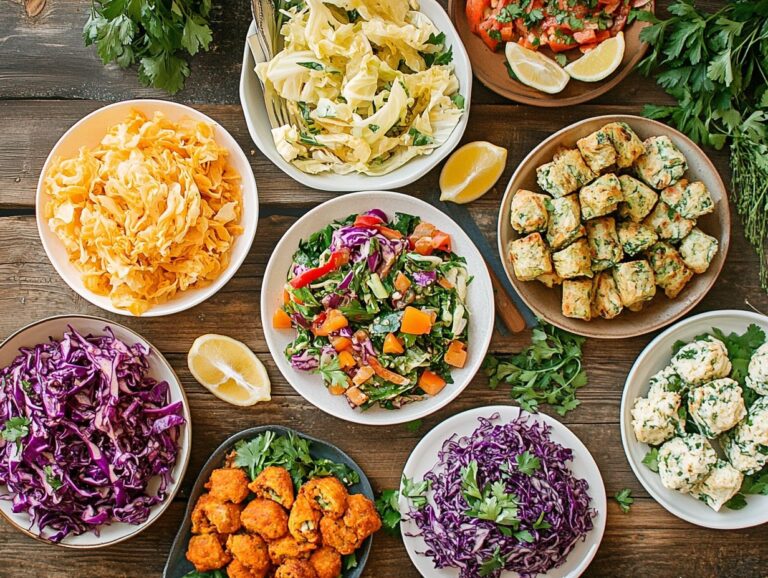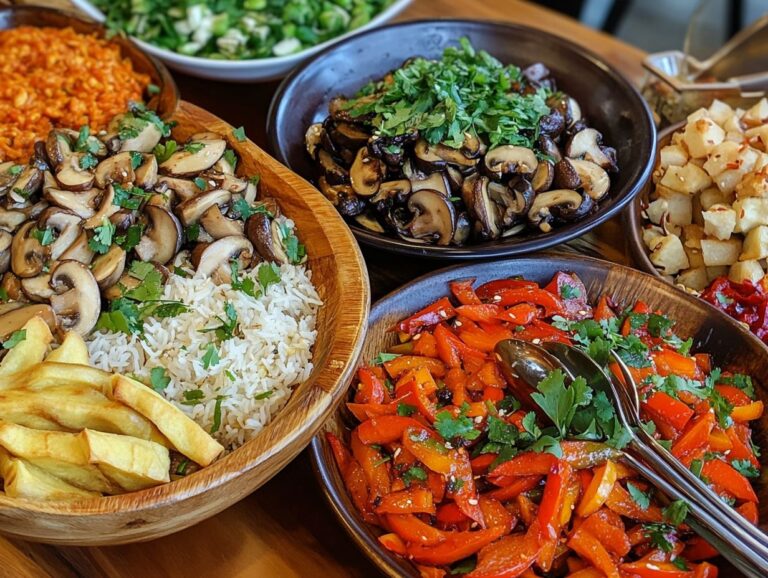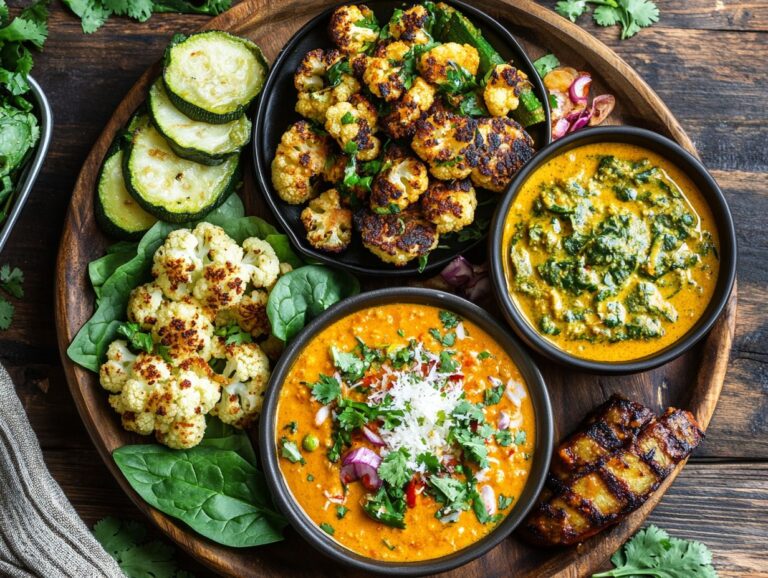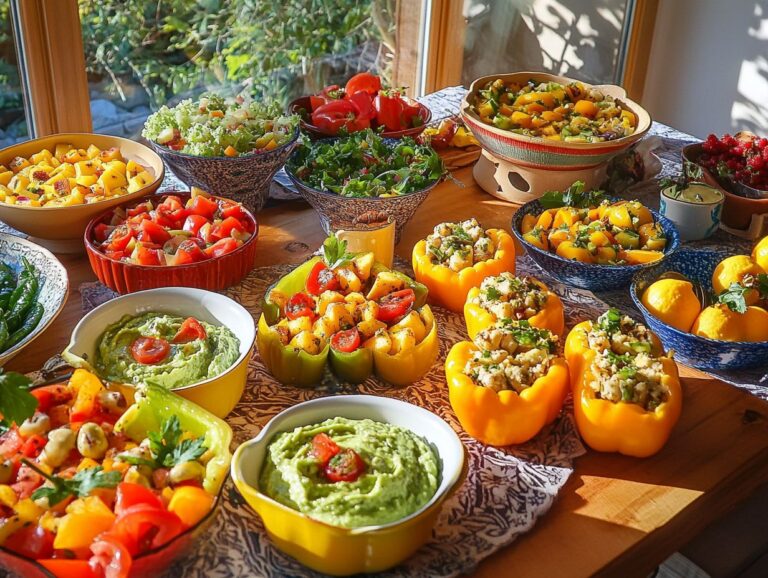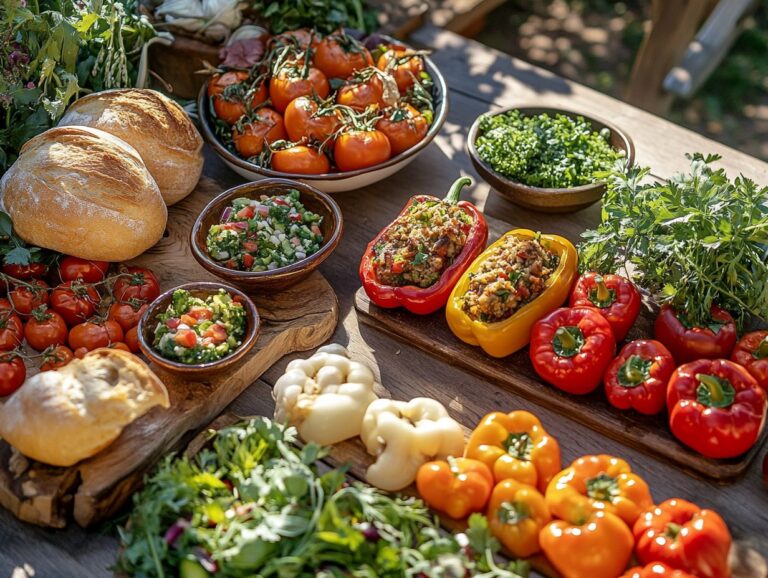The vibrant world of Israeli cuisine is characterized by fresh ingredients and bold flavors, which combine to create delicious vegan dishes. This article explores the unique qualities that define Israeli cooking while discussing the health benefits of a plant-based diet and offering delicious vegan recipes. Key staples that serve as the foundation for vegan Israeli meals are highlighted, along with popular dishes such as falafel and hummus. Additionally, the article offers tips for easily incorporating these nourishing meals into daily life, capturing the essence of Israeli vegan cooking.
What Makes Israeli Cuisine Unique?
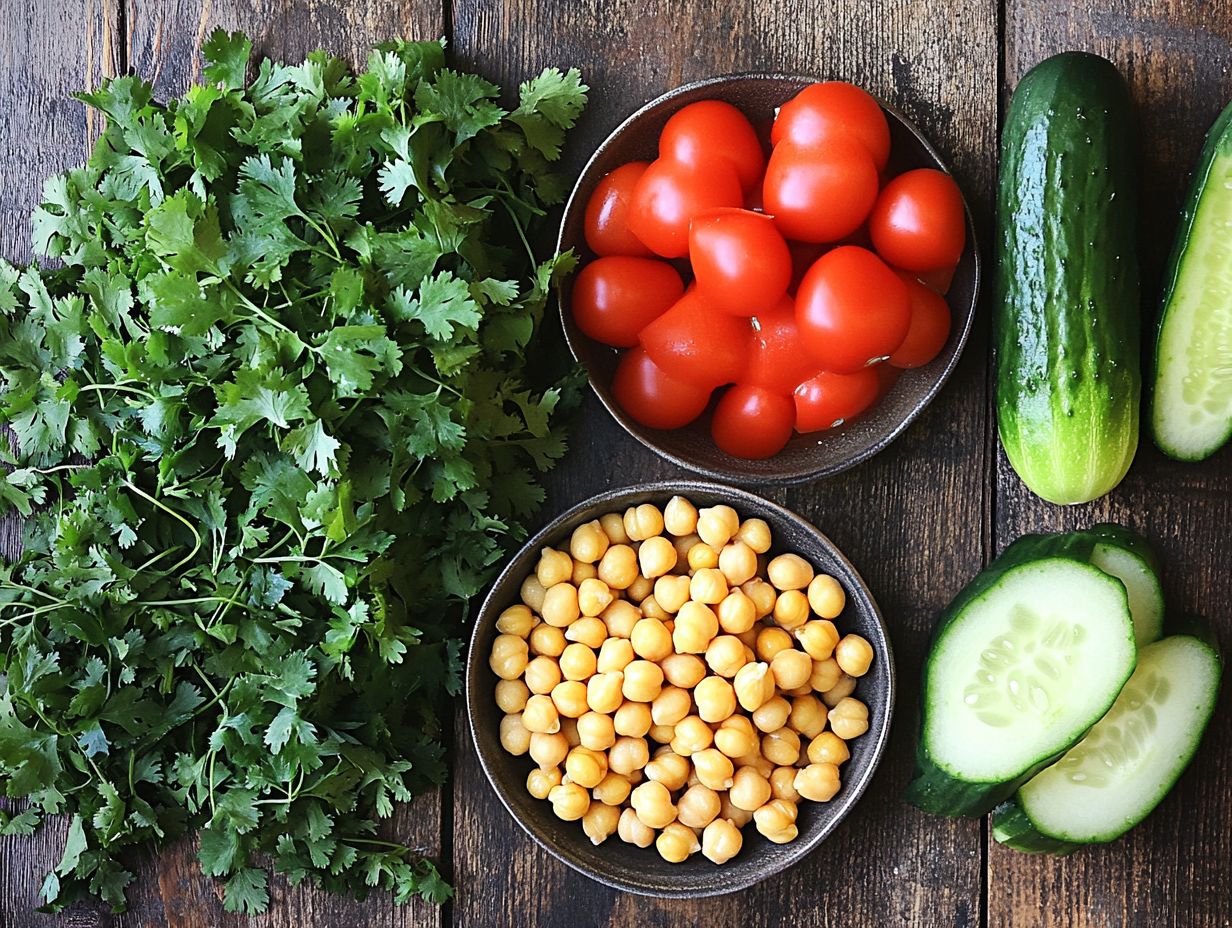 Israeli cuisine is distinguished by its rich tapestry of flavors and ingredients, reflecting a unique blend of cultural influences, regional produce, and culinary traditions. This vibrant cuisine offers numerous vegetarian recipes that highlight fresh and simple ingredients. It features vibrant vegetables and fresh herbs, with many Israeli dishes celebrating summer produce and showcasing the country s agricultural abundance, particularly in cities like Tel Aviv. The use of ingredient combinations like parsley, mint, lemon juice, and red wine vinegar creates refreshing salad dressings and earthy salads. The integration of Middle Eastern culinary elements, along with local ingredients, creates a dynamic food landscape that is both diverse and delicious, offering a culinary journey that captures the essence of the region’s history and culture. From falafel and hummus to baba ganoush and more, Israeli cuisine offers a variety of vegan recipes that cater to diverse palates. This cuisine draws on influences from Ashkenazi, Sephardic, and Middle Eastern culinary traditions, revealing a melting pot of flavors that includes spices like za’atar and sumac, as well as fresh ingredients like tomatoes, cucumbers, eggplant, and other nutrient-dense foods. Iconic dishes such as hummus, falafel, and shakshuka highlight the importance of simple yet flavorful combinations, often enjoyed in communal settings. Traditional cooking methods, such as grilling and slow cooking, enhance the depth of flavor, making every meal an experience that transcends mere sustenance and aligns with the plant-based diet philosophy. The celebration of food as a communal activity also underscores the social aspect of Israeli dining, where sharing plates fosters connections and cultural exchange, often enjoyed during an Israeli food night.
Israeli cuisine is distinguished by its rich tapestry of flavors and ingredients, reflecting a unique blend of cultural influences, regional produce, and culinary traditions. This vibrant cuisine offers numerous vegetarian recipes that highlight fresh and simple ingredients. It features vibrant vegetables and fresh herbs, with many Israeli dishes celebrating summer produce and showcasing the country s agricultural abundance, particularly in cities like Tel Aviv. The use of ingredient combinations like parsley, mint, lemon juice, and red wine vinegar creates refreshing salad dressings and earthy salads. The integration of Middle Eastern culinary elements, along with local ingredients, creates a dynamic food landscape that is both diverse and delicious, offering a culinary journey that captures the essence of the region’s history and culture. From falafel and hummus to baba ganoush and more, Israeli cuisine offers a variety of vegan recipes that cater to diverse palates. This cuisine draws on influences from Ashkenazi, Sephardic, and Middle Eastern culinary traditions, revealing a melting pot of flavors that includes spices like za’atar and sumac, as well as fresh ingredients like tomatoes, cucumbers, eggplant, and other nutrient-dense foods. Iconic dishes such as hummus, falafel, and shakshuka highlight the importance of simple yet flavorful combinations, often enjoyed in communal settings. Traditional cooking methods, such as grilling and slow cooking, enhance the depth of flavor, making every meal an experience that transcends mere sustenance and aligns with the plant-based diet philosophy. The celebration of food as a communal activity also underscores the social aspect of Israeli dining, where sharing plates fosters connections and cultural exchange, often enjoyed during an Israeli food night.
Benefits of a Vegan Diet
The health benefits of a vegan diet are numerous, which is one of the main reasons many people opt for veganism and healthy eating. Vegan diets consist of plant-based foods that offer more nutrients than processed foods, including essential vitamins, minerals, and antioxidants necessary for maintaining a healthy diet. This approach to eating emphasizes simple ingredients and easy-to-make recipes that promote overall well-being. A vegan diet promotes healthy eating and encourages simple recipes that incorporate a diverse range of fruits, vegetables, legumes, and grains. It includes delicious variations of traditional dishes and quick dinner options that can be prepared using a vegetable chopper.
Health Benefits of Plant-based Eating
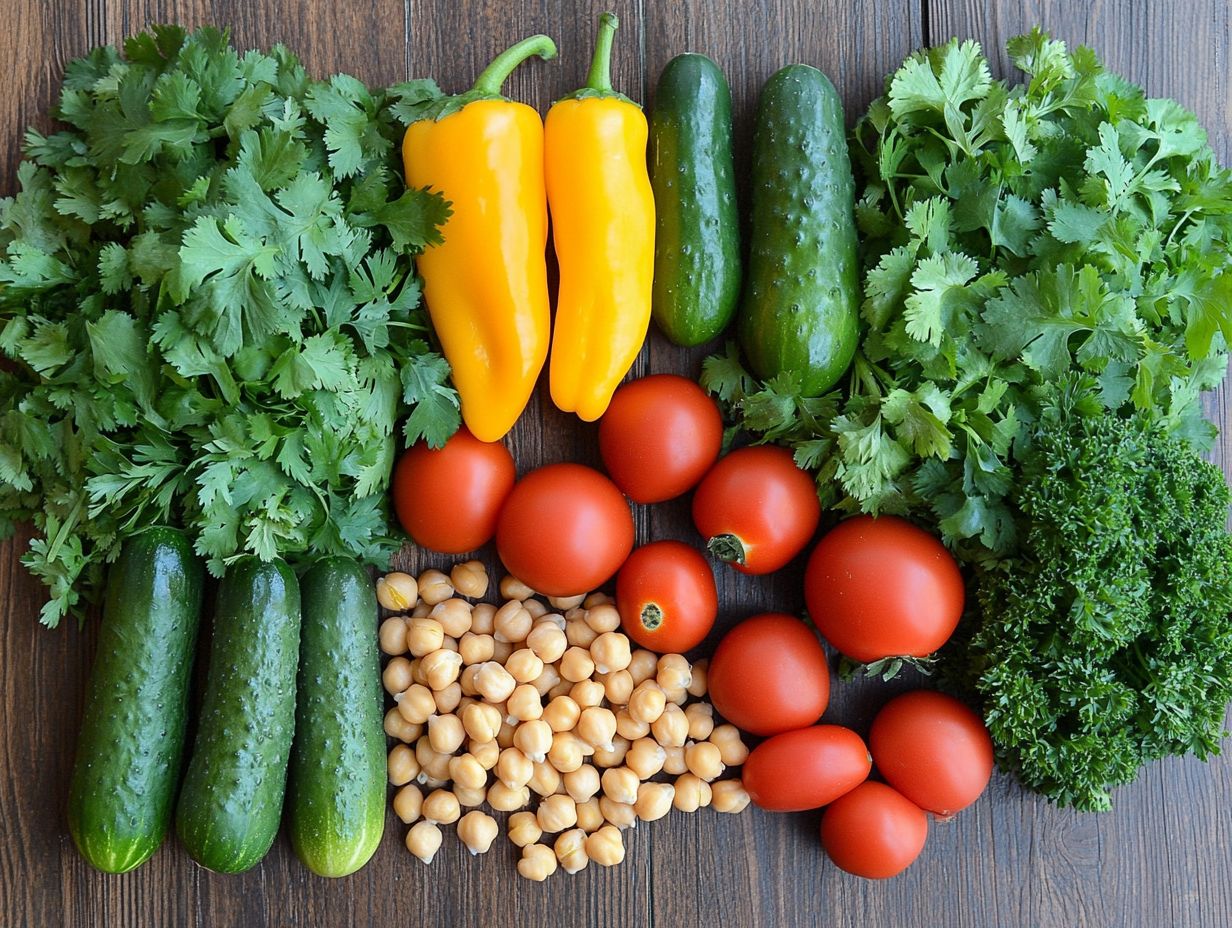 Plant-based eating is associated with numerous benefits, making it a popular lifestyle choice for those seeking to improve their health and embrace the vegetable love philosophy. By focusing on wholesome, nutritious foods, individuals can enjoy a variety of balanced flavors while obtaining essential nutrients, leading to healthy meals that are both satisfying and delicious. Incorporating healthful options, such as detoxifying salads and vibrant vegetable dishes, not only enhances physical health but also fosters a positive relationship with food and encourages mindful eating practices. Recipes like rainbow falafel and grilled cauliflower can add vibrant colors and nutritional value to any meal. Research indicates that plant-based diets can significantly improve cardiovascular health by lowering cholesterol levels and reducing the risk of cardiovascular disease. Key ingredients, such as leafy greens, berries, and nuts, are abundant in antioxidants and healthy fats that support overall heart function. Those who adopt a plant-based diet often find success in weight management, thanks to the high fiber content and low-calorie density of plant-based foods, which help regulate appetite. To ease the transition towards a more plant-based diet, individuals can try simple recipes like quinoa bowls or smoothie packs, allowing them to enjoy healthy meals without feeling overwhelmed. Using fresh lemon and lemon zest in salad dressings or chickpea salad can add a refreshing touch.
Plant-based eating is associated with numerous benefits, making it a popular lifestyle choice for those seeking to improve their health and embrace the vegetable love philosophy. By focusing on wholesome, nutritious foods, individuals can enjoy a variety of balanced flavors while obtaining essential nutrients, leading to healthy meals that are both satisfying and delicious. Incorporating healthful options, such as detoxifying salads and vibrant vegetable dishes, not only enhances physical health but also fosters a positive relationship with food and encourages mindful eating practices. Recipes like rainbow falafel and grilled cauliflower can add vibrant colors and nutritional value to any meal. Research indicates that plant-based diets can significantly improve cardiovascular health by lowering cholesterol levels and reducing the risk of cardiovascular disease. Key ingredients, such as leafy greens, berries, and nuts, are abundant in antioxidants and healthy fats that support overall heart function. Those who adopt a plant-based diet often find success in weight management, thanks to the high fiber content and low-calorie density of plant-based foods, which help regulate appetite. To ease the transition towards a more plant-based diet, individuals can try simple recipes like quinoa bowls or smoothie packs, allowing them to enjoy healthy meals without feeling overwhelmed. Using fresh lemon and lemon zest in salad dressings or chickpea salad can add a refreshing touch.
Key Ingredients in Israeli Vegan Cooking
Israeli vegan cooking emphasizes the use of fresh, high-quality ingredients that are staples in traditional dishes, making them both accessible and flavorful. These nutritious dishes are perfect for meal prep and offer a variety of delicious flavors. Key components include chickpeas, nutrient-dense fresh herbs like parsley and mint, and a variety of flavorful spices, which are essential for creating vibrant vegetable salads and creamy hummus that showcase the richness of Middle Eastern culinary traditions. Recipes like loaded hummus and stuffed sweet potato can bring new flavors to the table. Additionally, ingredients such as red wine vinegar and fresh lemon juice enhance the flavor profiles, resulting in balanced, satisfying, and nutritious plant-based meals. Incorporating sweet pomegranate and beluga lentils can add unexpected twists to these meals.
Fresh and Nutritious Staples
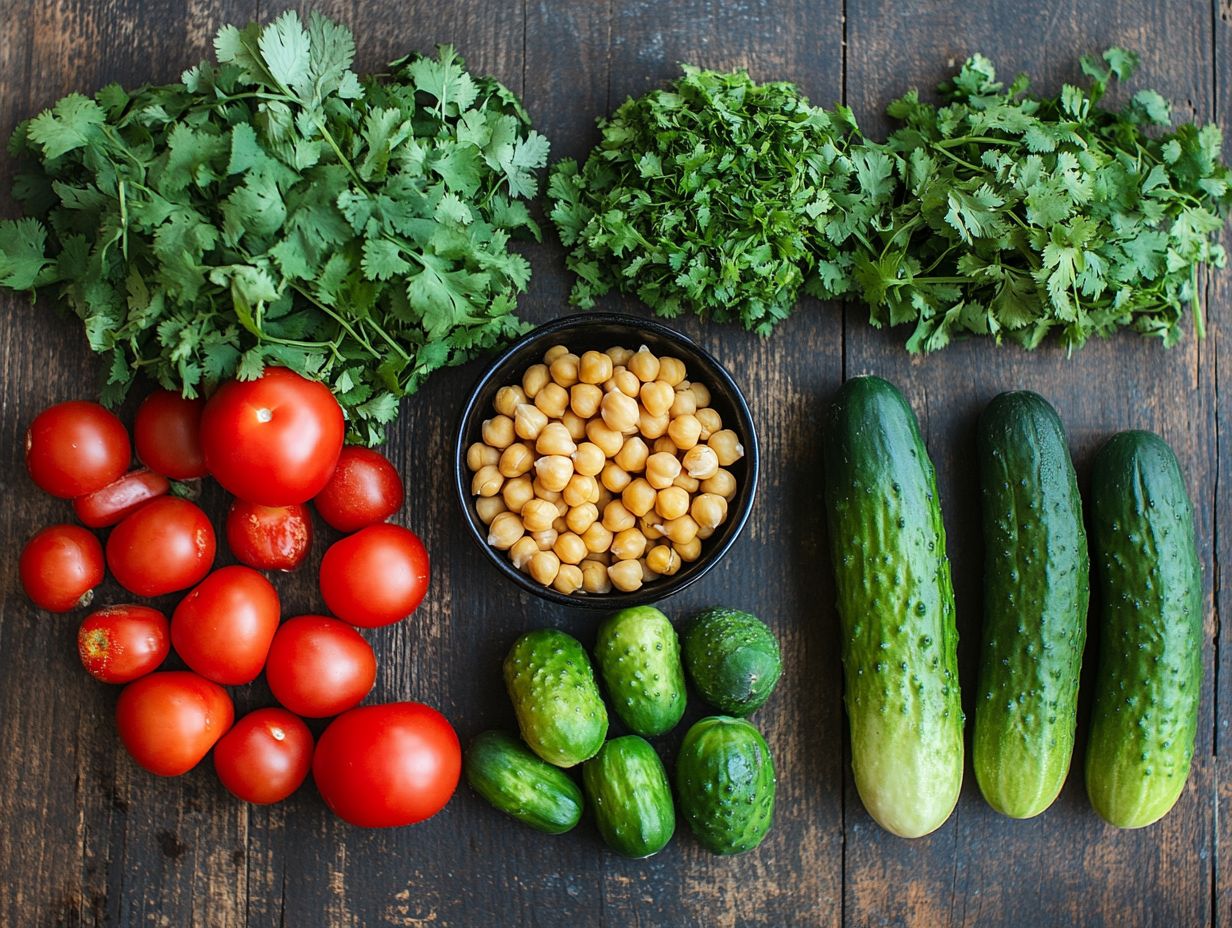 Fresh, nutritious staples form the foundation of Israeli vegan cooking, offering essential components for healthy, satisfying, and delicious meals. Ingredients like summer produce, vibrant vegetables, and legumes are not only flavorful but also packed with nutrients, embodying the ‘vegetable love’ philosophy. By substituting recipes with these staples, home cooks can unleash their creativity in the kitchen, ensuring that meals remain exciting while adhering to a plant-based diet. For instance, a chickpea salad with red onion, cucumber, grape tomatoes, and bell pepper can be a delightful addition to any meal. This diverse cuisine is enriched with staples such as fresh herbs, whole grains, and pulses, which enhance both the flavor and nutritional value of the diet. With easy recipes and cooking tips, anyone can enjoy the benefits of Israeli vegan cooking. Quinoa and farro serve as healthy bases for salads, while seasonal vegetables can shine in grilled dishes or light dips. Shakshuka and other dishes can be adapted for vegan enthusiasts by using plant-based ingredients. For those following gluten-free diets, pasta can easily be replaced with spiralized zucchini, preserving the dish’s taste and texture while accommodating dietary restrictions.
Fresh, nutritious staples form the foundation of Israeli vegan cooking, offering essential components for healthy, satisfying, and delicious meals. Ingredients like summer produce, vibrant vegetables, and legumes are not only flavorful but also packed with nutrients, embodying the ‘vegetable love’ philosophy. By substituting recipes with these staples, home cooks can unleash their creativity in the kitchen, ensuring that meals remain exciting while adhering to a plant-based diet. For instance, a chickpea salad with red onion, cucumber, grape tomatoes, and bell pepper can be a delightful addition to any meal. This diverse cuisine is enriched with staples such as fresh herbs, whole grains, and pulses, which enhance both the flavor and nutritional value of the diet. With easy recipes and cooking tips, anyone can enjoy the benefits of Israeli vegan cooking. Quinoa and farro serve as healthy bases for salads, while seasonal vegetables can shine in grilled dishes or light dips. Shakshuka and other dishes can be adapted for vegan enthusiasts by using plant-based ingredients. For those following gluten-free diets, pasta can easily be replaced with spiralized zucchini, preserving the dish’s taste and texture while accommodating dietary restrictions.
Popular Vegan Israeli Dishes
This article highlights popular vegan dishes from Israeli cuisine. Known for its diverse ingredients and flavors, Israeli cuisine features many iconic plant-based dishes, offering a wide variety of vegan options. Renowned Middle Eastern dishes such as falafel, creamy hummus, and baba ganoush are beloved in Israel and beyond for their unique flavor combinations, textures, versatility, and health benefits. Below are examples of traditional and modern vegan Israeli dishes that provide an array of flavors and nutrients.
- Hummus: Often regarded as the most iconic Middle Eastern dish and a staple of Israeli cuisine, hummus is a chickpea dip rich in protein, fiber, and various vitamins and minerals. The traditional preparation includes cooked and mashed chickpeas, tahini (sesame paste), lemon juice, and garlic, but it can be enhanced with toppings like olive oil, spices, roasted vegetables, and nuts. Hummus can be served simply with olive oil and spices or in bowls topped with vegetables or olives.
- Falafel: Made from ground chickpeas or fava beans seasoned with spices and herbs, falafel is a deep-fried ball or patty commonly served in pita bread or as part of a salad. Rainbow falafel features balls in various colors and flavors, such as beetroot, spinach, and turmeric, while stuffed falafel can be served as a complete meal.
- Baba Ghanoush: This thick and creamy dip, made from grilled or roasted eggplants, tahini, and lemon juice, is low in carbohydrates and high in antioxidants. It is typically drizzled with olive oil and garnished with spices like paprika and parsley, making it a delightful addition to any meal.
- Eggplant Dip: Similar to baba ghanoush but without tahini, this eggplant spread combines olive oil, garlic, and herbs. It can be enjoyed as a condiment or dip, often accompanied by pita bread or fresh vegetables.
- Labneh: A probiotic-rich strained yogurt, labneh can be made from plant-based yogurts or dairy-free milks, such as almond or coconut. It is frequently served as a side dish or snack and can be enhanced with fruits, spices, and vegetables for added flavor and nutrition.
- Stuffed Vegetables: Popular vegan Israeli dishes often include stuffed eggplant, zucchini, and peppers, providing a hearty meal option. These stuffed vegetables are typically served in a savory sauce.
- Israeli Salad: A vibrant summer salad made from finely chopped fresh vegetables, especially cucumbers and tomatoes, Israeli salad is a refreshing accompaniment to many dishes. It is rich in vitamins and minerals and can be customized with nuts, fruits, or plant-based cheeses according to personal taste.
- Shakshuka: Although not traditionally vegan, shakshuka can be adapted by substituting tofu or chickpea flour for eggs. This one-pan dish features a rich tomato sauce flavored with garlic, onion, and spices.
- Pita Bread: A staple of Middle Eastern cuisine, pita bread is a leavened flatbread made without dairy. It is often served alongside various dips, such as hummus and baba ganoush.
These vegan Israeli dishes showcase the rich culinary traditions of Israel while offering delicious, healthful options for plant-based diets. Hosting an Israeli food night can be a fun way to explore these flavors with friends and family.
Recipes for Falafel, Hummus, and More
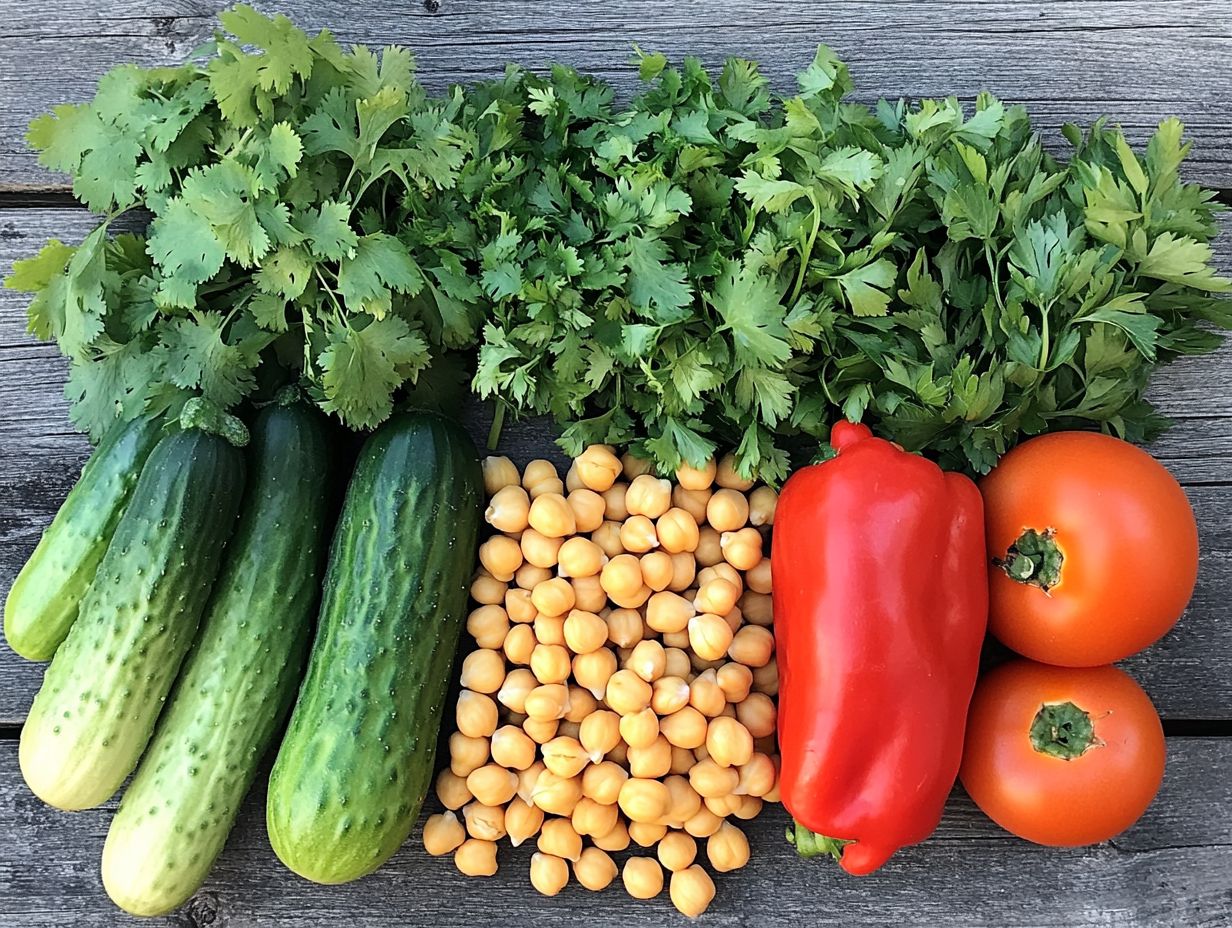 Falafel and hummus are among the most popular vegan dishes in Israeli cuisine, known for their varied flavors and textures. These quick and easy recipes are perfect for anyone looking to enjoy the benefits of a plant-based diet. Both recipes are simple and can be easily modified to suit individual preferences by adjusting spices or adding extras such as chickpea salad or fresh herb and vegetable salads. These recipes highlight the versatility of simple ingredients and the joy of healthy eating. These dishes showcase the deliciousness of plant-based eating and highlight the creativity involved in preparing traditional foods in a modern context. Homemade falafel can incorporate spices like cumin, coriander, and garlic, which create a fragrant aroma and rich flavor. Hummus can be enhanced with ingredients such as roasted red peppers or sun-dried tomatoes, elevating the basic recipe beyond its traditional preparation. These dishes can be served with pickled vegetables or a drizzle of olive oil, enhancing their presentation while also providing the benefits of fiber and healthy fats. Additionally, ingredients like avocado or pine nuts can be added to create a creamier texture and introduce a distinctive flavor. With these culinary tips, anyone can experience the delightful variations of Middle Eastern cuisine.
Falafel and hummus are among the most popular vegan dishes in Israeli cuisine, known for their varied flavors and textures. These quick and easy recipes are perfect for anyone looking to enjoy the benefits of a plant-based diet. Both recipes are simple and can be easily modified to suit individual preferences by adjusting spices or adding extras such as chickpea salad or fresh herb and vegetable salads. These recipes highlight the versatility of simple ingredients and the joy of healthy eating. These dishes showcase the deliciousness of plant-based eating and highlight the creativity involved in preparing traditional foods in a modern context. Homemade falafel can incorporate spices like cumin, coriander, and garlic, which create a fragrant aroma and rich flavor. Hummus can be enhanced with ingredients such as roasted red peppers or sun-dried tomatoes, elevating the basic recipe beyond its traditional preparation. These dishes can be served with pickled vegetables or a drizzle of olive oil, enhancing their presentation while also providing the benefits of fiber and healthy fats. Additionally, ingredients like avocado or pine nuts can be added to create a creamier texture and introduce a distinctive flavor. With these culinary tips, anyone can experience the delightful variations of Middle Eastern cuisine.
Tips for Incorporating Israeli Vegan Meals into Your Diet
Incorporating Israeli vegan meals into your diet is an enjoyable way to introduce flavorful and nutritious foods, such as creamy hummus and vibrant vegetable salads like Israeli salad. Prioritizing meal planning and preparation can facilitate the transition to a plant-based diet, with various resources offering easy recipes and cooking tips to simplify the process, including advice on crafting a detoxing salad or a quick chickpea salad. By focusing on fresh ingredients and vibrant dishes like grilled cauliflower and stuffed sweet potato, you can experience the health benefits of a vegan diet while also exploring the rich traditions of Israeli cuisine.
Meal Planning and Shopping Tips
Effective meal planning and shopping are essential for ensuring that your vegan meals are balanced, flavorful, and made with fresh ingredients. By focusing on fresh produce like summer produce, you can prioritize seasonal and nutrient-dense foods, creating meals that are satisfying and aligned with your dietary goals, such as an earthy salad with bright lemon zest. Simple recipes can help you reduce your time in the kitchen while maximizing flavor, making it easier to maintain a sustainable plant-based lifestyle. To create a balanced grocery list, it is helpful to group items by categories such as:
- Fruits, including sweet pomegranate and fresh lemon
- Vegetables
- Grains
- Proteins, such as chickpeas and beluga lentils
- Condiments
This approach not only ensures that you have vibrant, fresh produce but also streamlines your shopping experience, making it easier to plan for delicious variations of classic dishes. Additionally, batching multiple meals at once is an effective strategy for having ready-to-eat meals throughout the week. Preparing larger quantities allows you to store them in the refrigerator or freezer for easy access on busier days, enabling you to enjoy your favorite vegan recipes regularly. Simple recipes like stir-fries or grain bowls are particularly suitable for this, as they often require minimal prep time and can serve as a delicious and nutritious base for meals throughout the week.
Embracing a Vegan Lifestyle with Israeli Cuisine
The benefits of a vegan diet aligned with Israeli cuisine are largely the same as those of a general vegan diet. However, the unique characteristics of Israeli cuisine enhance the experience and enjoyment of following a vegan lifestyle. Embracing a vegan diet inspired by Israeli cuisine introduces a wide range of flavors and textures into everyday meals, promoting healthy eating and a balanced approach to eating without sacrificing taste and satisfaction. Israel’s diverse cultural landscape contributes to a rich tapestry of culinary traditions that can be explored and appreciated. The abundance of fresh ingredients, bold flavors, and healthy cooking techniques present in Israeli cuisine make it an excellent foundation for a plant-based diet. By incorporating key elements of Israeli cuisine, such as legumes, whole grains, tahini, seasonal vegetables, and fresh herbs like parsley and mint, individuals can discover healthier versions of their favorite dishes. Here are some methods for integrating the benefits of a vegan diet inspired by Israeli cuisine into everyday meals, though this list is not exhaustive:
- Making Healthy Versions of Comfort Foods: Staples of Israeli cuisine, like bulgur and chickpeas, can be added to create healthier versions of comfort foods. For instance, a simple bulgur salad with cucumber, red onion, and grape tomatoes can be prepared with a dressing of lemon juice, olive oil, salt, and pepper. Alternatively, a chickpea version of traditional shakshuka can be made by substituting tofu or an egg alternative for the eggs, maintaining the rich flavors of the tomato sauce.
- Bringing Friends and Family Together: Cooking and sharing meals is an integral part of Israeli culture. Hosting an Israeli food night allows individuals to enjoy the communal benefits of togetherness. The act of cooking can be a joyful experience that fosters fond memories and lasting bonds.
- Adding Key Ingredients to Everyday Meals: Fresh herbs are essential in many Israeli dishes. Incorporating fresh herbs like parsley and mint into daily meals can significantly enhance both the flavor and nutritional value. Popular Mediterranean herbs such as basil, parsley, dill, and mint complement traditional Israeli dishes well. Additionally, seasoning and topping salads with tahini and healthy oils like olive oil are simple ways to elevate ordinary meals.
- Adding Innovative Ingredients to Traditional Recipes: Dairy and eggs play a significant role in traditional Israeli cuisine. However, innovative ingredients such as plant-based milk and egg substitutes (e.g., tofu) can easily be incorporated into traditional dishes to create vegan versions without sacrificing taste. For example, plant-based milk like almond milk can be used in a classic Israeli breakfast of shakshuka (poached eggs in tomato sauce) while preserving the core ingredients of the original dish.
Explore the potential of Middle Eastern cuisine by experimenting with loaded hummus, rainbow falafel, and baba ganoush, creating a culinary experience that delights vegan enthusiasts and enhances your plant-based diet.
